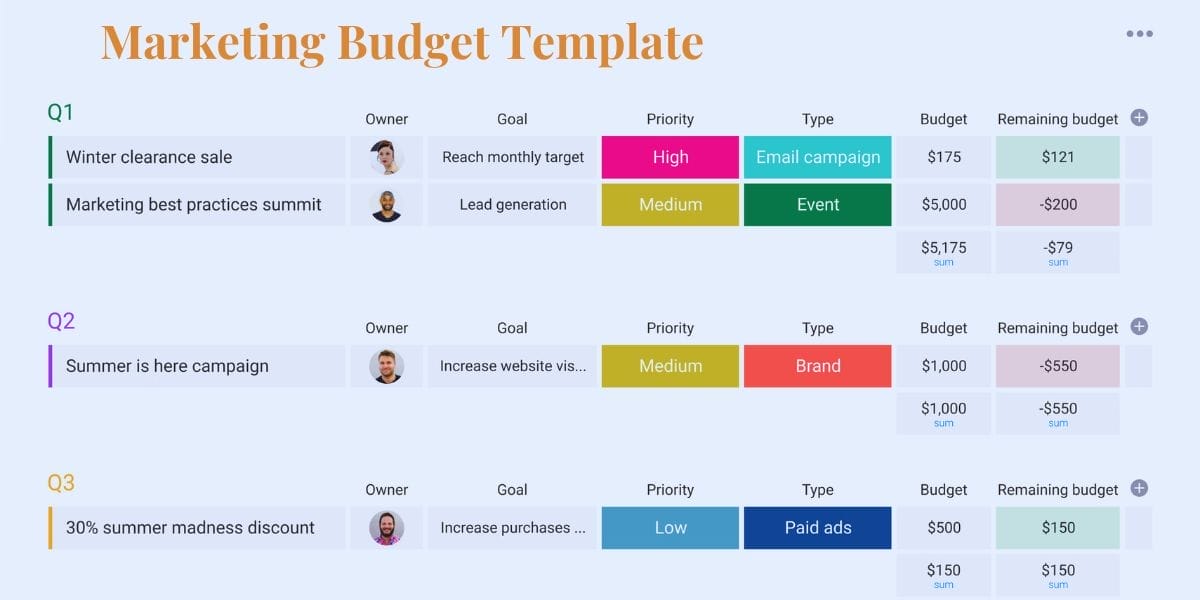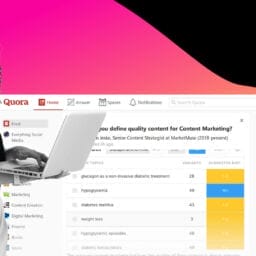Creating a digital marketing plan that works for your budget

As a marketer, creating an effective digital marketing plan that aligns with your budget is crucial for achieving marketing goals. This involves strategically allocating your budget for digital marketing efforts across different channels, such as social media, content, SEO, and email marketing, to maximize ROI. By following a structured approach and utilizing a marketing budget template, you can create a digital marketing plan that drives brand awareness and effectively engages your target audience.
In this article, we will explore how to create a digital marketing plan that works for your budget. We’ll discuss the importance of understanding your target audience, setting clear and achievable goals, and leveraging cost-effective channels to reach your potential customers. Additionally, we’ll provide tips on how to track and measure the success of your digital marketing efforts to ensure that you are getting the most out of your budget.
Whether you are a small start-up or a well-established company, this article will provide you with valuable insights and practical strategies to help you develop a digital marketing plan that gets results without breaking the bank.
Boost Your Business with New AI Trends – Get a Free Strategy Session Today
Steps to Create a Digital Marketing Budget
Creating a digital marketing budget is an essential step in any successful online marketing campaign. By understanding your target audience, your business goals, and the costs associated with different digital marketing channels, you can develop a budget that will help you achieve your desired results. Here are the steps to create a digital marketing budget:
Determine Your Overall Budget:
The amount you allocate to your digital marketing budget will depend on your company’s size, industry, and revenue. A good rule of thumb is to give 5-10% of your overall marketing budget to digital marketing. However, this ratio may vary depending on your business goals and objectives.
Research Your Target Audience:
Comprehending your target audience is necessary for creating an adequate digital marketing budget. Who are you trying to reach with your marketing messages? What are their demographics, interests, and online behavior? Once you comprehend your target audience well, you can determine the most influential channels for reaching them.
Choose the Right Digital Marketing Channels:


Various digital marketing channels are available, each with its strengths and weaknesses. Some of the most popular channels include:
- Search Engine Optimization (SEO)
- Pay-per-click (PPC) advertising
- Social media marketing
- Email marketing
- Content marketing
- Affiliate marketing
The proper channels for your business will depend on your target audience, goals, and budget.
Estimate Costs for Each Channel:
Once you have chosen the channels you will use, you need to estimate their costs. This will involve researching pricing models, understanding ad costs, and considering additional expenses like software or agency fees.
Allocate Funds to Each Channel:
After you have estimated the costs for each channel, you can allocate your budget accordingly. Prioritize the channels you believe will have the highest ROI and leave some room for experimentation and testing.
Track and Measure Results:


It is essential to track & measure the results of your digital marketing campaigns to see which channels are performing well & which ones need improvement. Utilize analytics tools to track website traffic, lead generation, and sales metrics.
Review and Adjust Your Budget:
Your digital marketing budget is not a fixed document. It should be reviewed and adjusted regularly based on your results. If you are still seeking the desired results, you may need to reallocate your funds to different channels or strategies.
Creating an Effective Digital Marketing Plan


Identifying Your Target Audience in Digital Marketing
Determining your target audience is fundamental to creating an effective digital marketing plan. Understanding your audience’s demographics, interests, and behavior can help you effectively tailor your marketing strategy to engage and convert potential customers.
Utilizing SEO in Your Digital Marketing Plan
A strategic search engine optimization (SEO) technique is essential for elevating your brand’s online presence and attracting targeted visitors to your digital properties. By optimizing your website & content to align with search engine algorithms, you can amplify your digital marketing efforts and draw in qualified traffic that resonates with your brand.


Social media marketing is the most effective tool for building brand awareness, engaging with your audience, and driving website traffic. Combining social media into your digital marketing plan can help you leverage various social platform’s reach and targeting capabilities to connect with your audience.
Implementing Content Marketing for Digital Brand Awareness


Implementing content marketing for digital brand awareness is vital for businesses looking to establish a solid online presence. Businesses can attract & retain a clearly defined audience by creating and distributing valuable, relevant, consistent content, ultimately driving profitable customer action. Content marketing allows brands to showcase their expertise and build trust with their audience, positioning themselves as industry leaders. Businesses can reach a wider audience & increase brand visibility through various digital channels such as social media, blogs, and email.
By consistently delivering high-quality content, businesses can improve their search engine ranking, driving more organic traffic to their website. Additionally, content marketing allows brands to engage with their audience meaningfully, fostering customer loyalty and advocacy. Overall, implementing content marketing for digital brand awareness is a more powerful tool for businesses to connect with their target audience, establish credibility & drive business growth in the digital landscape.
Utilizing Email Marketing for Effective Campaigns
Email marketing is a direct & cost-effective way to nurture leads, drive conversions, and build customer loyalty. By integrating email marketing into your digital marketing strategy, you can create targeted campaigns that deliver personalized messaging and drive engagement with your audience
Strategies for Allocating Your Budget for Digital Marketing


When allocating your budget for digital marketing, consider your business’s unique needs, the competitive landscape, and the specific objectives you want to achieve. A strategic approach to budget allocation can help you build a convincing digital marketing plan that maximizes the impact of your marketing efforts while staying within your budget constraints.
In the dynamic realm of digital marketing, budget allocation plays a pivotal role in determining the success of your online campaigns. A well-crafted strategy ensures that your resources are channeled effectively toward the channels and initiatives that align with your business goals and maximize your return on investment (ROI).
Define Your Digital Marketing Objectives
Before allocating budgets, it’s crucial to establish clear and measurable objectives for digital marketing efforts. What do you aim to achieve through your online campaigns? Are you seeking to increase brand awareness, generate leads, drive sales, or enhance customer engagement? Well-defined objectives will guide your budget allocation decisions.
Analyze Your Historical Data and Current Performance
Delving into your historical data and current performance metrics provides valuable insights into which digital marketing channels have been most effective for your business. Identify channels that have consistently yielded positive results, such as increased website traffic, conversion rates, or customer engagement. This analysis will help you prioritize your budget allocation.
Consider Your Target Audience and Buyer Personas
Understanding your target audience & buyer personas is essential for tailoring your budget allocation strategy. Identify their demographics, online behaviors, and preferred digital channels. This knowledge will guide you in allocating resources toward the channels most likely to effectively reach and engage your target audience.
Evaluate Channel Costs and ROI Potential
Each digital marketing channel has a unique cost structure and ROI potential. Research the average costs of different channels, such as pay-per-click (PPC) advertising, social media marketing, and content creation. Then, assess each channel’s ROI potential based on your historical performance and industry benchmarks.
Allocate Your Budget Based on Objectives and Performance
Allocate your budget according to your objectives, historical data, target audience, and channel costs. Prioritize channels that align with your objectives, have demonstrated strong performance, and are likely to reach your target audience effectively. Adjust your budget allocation periodically based on campaign performance and evolving market trends.
Continuously Monitor and Optimize
Digital marketing is an ever-evolving landscape; your budget allocation strategy should reflect this dynamism. Continuously monitor your campaign’s performance and adjust your budget accordingly. Use data-driven insights to identify underperforming channels and reallocate resources to those getting better results
Marketing Budget Template


A marketing budget template can help you create a structured budget allocation plan across different marketing channels. It allows you to visualize your marketing activities and ensure your budget is effectively distributed to support your overall marketing strategy.
ROI in Digital Marketing
Measuring the ROI of your digital marketing actions is essential for evaluating the efficacy of your strategy. Tools like HubSpot can help you track and analyze the performance of your marketing campaigns, enabling you to make data-driven decisions & optimize your budget allocation for better ROI.
Boost Your Business with New AI Trends – Get a Free Strategy Session Today
Tips on how to track and measure the success of your digital marketing efforts:


Tracking and measuring the success of your digital marketing efforts is crucial for ensuring that you’re making the most of your budget and achieving your business goals. Here are some essential tips for effective tracking and measurement:
-
Set SMART Goals: Before diving into any digital marketing campaign, clearly define your objectives. Establish SMART (Specific, Measurable, Achievable, Relevant, and Time-bound) goals that align with your overall business strategy. These goals will serve as the foundation for your measurement framework.
-
Identify Key Performance Indicators (KPIs): KPIs are quantifiable metrics that reflect the progress towards your goals. Select relevant KPIs that align with your digital marketing objectives. For instance, if your goal is to increase website traffic, relevant KPIs could include website visits, page views, and bounce rate.
-
Utilize Analytics Tools: Leverage analytics tools like Google Analytics, Adobe Analytics, and social media platform analytics to track and measure your KPIs. These tools provide valuable insights into user behavior, campaign performance, and overall digital marketing effectiveness.
-
Monitor Website Traffic: Website traffic is a fundamental metric for assessing the reach of your digital marketing efforts. Track website visits, page views, and bounce rates to understand how users are interacting with your website. Identify which channels are driving the most traffic and analyze user behavior to optimize your website for better engagement.
-
Track Conversion Rates: Conversion rates measure the percentage of visitors who take a desired action, such as making a purchase, signing up for a newsletter, or downloading a whitepaper. Tracking conversion rates is crucial for evaluating the effectiveness of your marketing campaigns in generating leads and driving sales.
-
Measure Social Media Engagement: Social media engagement metrics like likes, shares, comments, and retweets provide valuable insights into the impact of your social media campaigns. Track these metrics to gauge brand awareness, audience interaction, and the effectiveness of your social media content.
-
Monitor Email Marketing Performance: Email marketing remains a powerful tool for nurturing leads and driving conversions. Track email open rates, click-through rates, and conversion rates to assess the effectiveness of your email campaigns. Analyze subscriber behavior and segment your email lists to improve engagement and results.
-
Analyze Return on Investment (ROI): ROI is a critical metric that measures the profitability of your digital marketing efforts. Calculate ROI by dividing the total revenue generated by your digital marketing efforts by the total cost of those efforts. Track ROI over time to assess the long-term effectiveness of your digital marketing investments.
-
Establish Regular Reporting: Schedule regular reporting intervals to review and analyze your digital marketing performance. Create comprehensive reports that summarize key metrics, identify trends, and provide insights for data-driven decision-making. Share these reports with stakeholders to ensure alignment and transparency.
-
Continuously Optimize and Improve: Digital marketing is an ever-evolving landscape. Continuously analyze your data, identify areas for improvement, and make data-driven adjustments to your campaigns. Experiment with new strategies, test different approaches and refine your tactics to maximize the impact of your digital marketing efforts.
Conclusion:
In conclusion, creating a digital marketing plan that fits your budget is essential for maximizing the effectiveness of your marketing efforts. With strategic planning and a focus on cost-effective channels, you can reach your target audience within your budget. By continuously monitoring & optimizing your digital marketing strategy, you can guarantee you obtain the most of your investment and compete with larger businesses in your industry.
To succeed in digital marketing, establish clear goals and budget, research cost-effective channels, use social media, email, and content creation, analyze performance, allocate budget strategically, and optimize performance for maximum ROI.




















